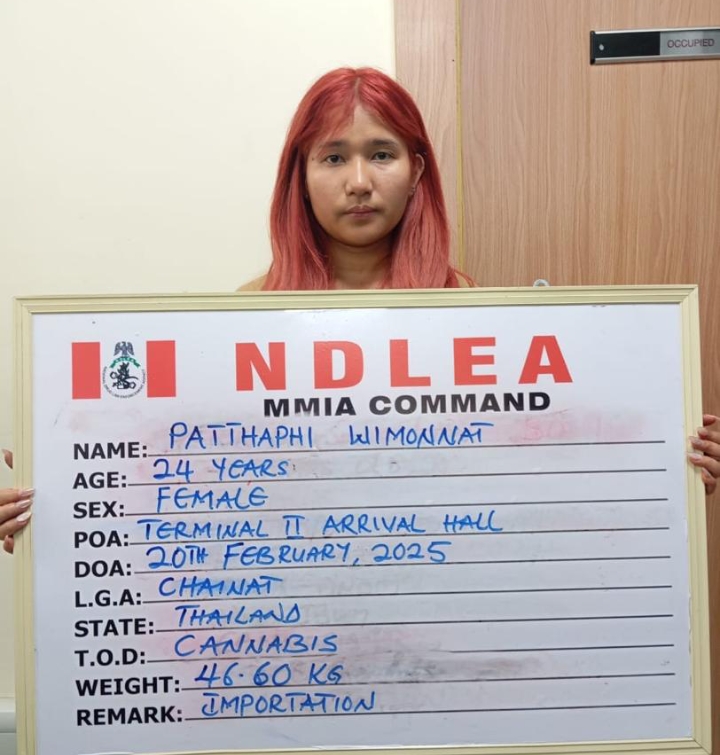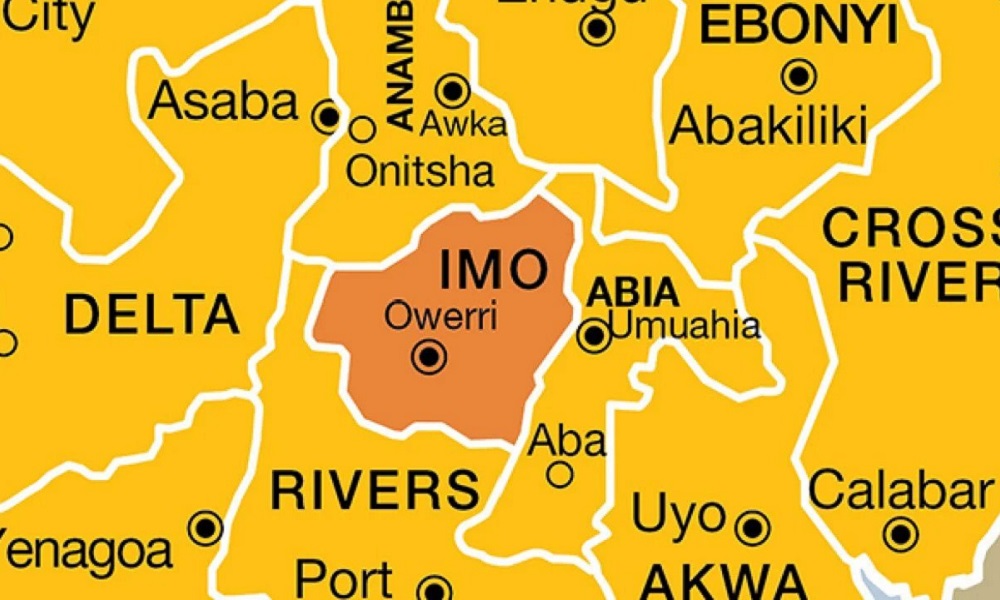News
Reps Demand Document On Cost Of Production From Cement Manufacturers

News
Thai lady arrested at Lagos airport with boxes of illicit drug consignments . As NDLEA intercepts UK-bound drug shipments concealed in walls of crated cartons

By Kayode Sanni-Arewa
Attempt by a 24-year-old Thai lady, Ms. Pattaphi Wimonnat, to smuggle 43 parcels of Canadian Loud, a synthetic strain of cannabis, weighing 46.60 kilograms into Nigeria through the Murtala Muhammed International Airport, MMIA, Ikeja Lagos has been thwarted by operatives of the National Drug Law Enforcement Agency, NDLEA, who arrested her after discovering the illicit consignment in her boxes.
The suspect who confessed to being a hired drug trafficker was arrested on Thursday 20th February 2025 during the inward clearance of passengers on Qatar Airways flight from Thailand via Doha, Qatar at the arrival hall, terminal 2 of the Lagos airport. She said the drug cartel, which recruited her promised to pay her $3,000 upon successful delivery of the illicit drug consignment in Nigeria.
Another bid by a drug trafficking syndicate to ship 68 parcels of Ghanaian Loud with a total weight of 42.2kg concealed in walls of crated cartons to London, UK, through the export shed of the Lagos airport was also frustrated by NDLEA officers on Friday 21st February. Three suspects: a freight agent and two dispatch riders were initially arrested in connection with the seizure before the mastermind of the shipment, Samuel Bitris, was swiftly traced to his Exodus Estate, Ajah, Lagos home where he was arrested.
At the Port Harcourt Port Complex, Onne, Rivers state, NDLEA officers on Thursday 20th February intercepted 49 cartons containing 49,000 pills of tamol, a brand of tramadol 225mg in a 40ft container during a joint examination of the shipment with men of Customs Service and other security agencies.
In Nasarawa state, NDLEA operatives on Saturday 22nd February arrested two suspects: Bello Adamu, 40, and Pius Azuka, 42 at Kokona/Keffi with 517kg of skunk, while two other suspects: Usman Ruwa, 43, and Yunusa Haruna, 45, were nabbed in a Toyota Corolla car conveying 62.7 kilograms of skunk along Sabon Asibiti road Kontagora, Niger state on Thursday 20th February.
With the same vigour, Commands and formations of the Agency across the country continued their War Against Drug Abuse, WADA, sensitization activities to schools, worship centres, work places and communities among others in the past week. These include: WADA sensitisation lecture to students and staff of Maku Grammar School, Tapa, Oyo state; Comprehensive Secondary School, Orogwe, Imo state; Jama’atu Islamiyya Secondary School, Ankpa, Kogi state; and Owerri-Aba Primary School, Ugwunagba, Imo state, among others.
While commending the officers and men of MMIA, PHPC, Niger, and Nasarwa Commands of the Agency for the arrests and seizures, Chairman/Chief Executive Officer of NDLEA, Brig. Gen. Mohamed Buba Marwa (Rtd) stated that their operational successes and those of their compatriots across the country especially their balanced approach to drug supply reduction and drug demand reduction efforts are well appreciated.
News
NSCDC, Tantita intensify joint efforts to combat oil theft in Niger Delta

The Nigeria Security and Civil Defence Corps (NSCDC) and Tantita Security Services Limited (TSSL) have intensified their joint efforts to eliminate economic sabotage in the Niger Delta, in line with the Renewed Hope Agenda set forth by President Bola Ahmed Tinubu.
As part of his inspection of NSCDC operations in the area, Commandant-General Dr. Abubakar Audi led a group of senior officers to meet with Chief Kestin Pondi, Managing Director of TSSL, and High Chief Government Ekpemupolo, commonly referred to as Tompolo, in Warri and Oporoza, Delta State.
Audi and his team also toured the operational facilities of NSCDC operatives working with Tantita in far-flung creeks of the Niger Delta and other formations to assess their activities and encourage the frontline security agents.
The Commandant-General while paying a courtesy visit to Pondi said his operational tour of the Niger Delta was to enable him get first hand information of his men on ground and strengthen the relationship between the corps and Tantita.
Audi said the NSCDC would celebrate the gallantry of his men on March 1st adding that the occasion would recognise fallen heroes of the corps and empower the families of deceased officers.
He said: “We place high premium on the welfare of our staff that is why every March 1st we recognise our personnel who died on active duty by assisting their families through payment of life insurance benefits and other empowerment schemes.”
In his remarks, the Managing Director, Tantita Security Services Ltd, Mr Kestin Pondi, heaped praises on President Ahmed Tinubu for providing the enabling environment to fight oil theft in the Niger Delta region.
He assured of closer collaboration with security forces including the NSCDC in the ongoing efforts to tackle pipeline vandalism and oil theft.
Pondi said without the collaborative efforts of the NSCDC and other security agencies, the success record would have been impossible.
He said prior to Tantita’s involvement in combating oil theft, production levels hovered around 800,000 barrels per day, adding that the increased production was because of the collaboration with NSCDC.
He said: “The success recorded in the recent past is not without the collaborative efforts of NSCDC. At the moment we have over 450 personnel in our organisation who have been providing collaborative services to our personnel.
“It is worthy of note that as at the time we came on board, the nation was producing between 600000 – 800000 barrels per day in 2022, but as at today we have gone over 2 million barrels per day and this is largely due to our collaboration with you.
A former President, Ijaw Youths Council (IYC) Worldwide, Engr. Udengs Eradiri, hailed NSCDC and Tantita for their mutual relationship saying their operational style was in line with President Tinubu’s leadership approach of community and stakeholders’ engagements.
Describing President Tinubu as a community man, Eradiri said Tinubu’s approach was centered around the people adding that in similar way Tantita and NSCDC approach instilled confidence in people to protect oil facilities within their domain.
“This is in line with President Tinubu’s leadership style. President Tinubu is a community man. His approach has always been about the people. For some of us who have known him for years ago, we are not surprised that he is doing things differently.
“Recall that when he was campaigning he came to the Gbaramatu Kingdom. President Tinubu expanded the relationship with Tantita and consolidated on what he met and that is why the trajectory has been smooth. President Tinubu is the reason Tantita is succeeding and we want to commend him for believing in Tompolo and the people,” he said.
News
Imo govt warns nightclub, lounge proprietors against selling hard drugs to customers

The Imo Government has issued a stern warning to hotel owners and nightclub operators, urging them to refrain from permitting the use of hard drugs within their establishments.
This announcement was made in a statement signed by Chief Ezechukwu Obonna, the Special Adviser to Governor Hope Uzodinma on Narcotics and Illicit Drugs Monitoring, and was shared with journalists in Owerri on Saturday.
According to Obonna, the state government has observed that hard drugs, especially cannabis, popularly called ‘loud’, are now being freely sold and consumed in public places, especially in lounges and nightclubs in the state, as if the drug is no longer prohibited by law.
He warned operators of nightclubs and lounges to immediately put an end to the consumption and sale of hard drugs, particularly in their business areas.
He said that any establishment found to be enabling or permitting the use of hard drugs would face severe consequences.
“The government is issuing this stern warning to lounge and nightclub owners across the state to note that the government will no longer tolerate the use of private businesses as havens for illicit drug use.
“We urge all lounge and nightclub owners to take responsibility for ensuring their patrons are not engaging in illicit activities.
“The Imo State Government is committed to protecting the health and well-being of its citizens, and we will not hesitate to take action against those who compromise this effort,” he said.
He added that the International Narcotics Control Board had expressed concerns about the growing trend of drug use and its impact on public health.
According to him, the Imo Government is taking proactive steps to address this issue and ensure a safer, healthier environment for all citizens.
“We appeal to all lounge and nightclub owners to cooperate with the government in this effort and to report any suspicious activities to the authorities immediately. Together, we can create a safer, more responsible tourism and entertainment industry in Imo,” he said.
-

 News23 hours ago
News23 hours agoBook launch: Abacha’s daughter, Gumsu derides Babangida
-

 News23 hours ago
News23 hours agoSocial media in awe as former RCCG pastor ties nuptials with male lover
-

 News23 hours ago
News23 hours agoJustice Delayed: The Imperative for Accountability in the Wake of Ibrahim Babangida’s Autobiography
-

 News22 hours ago
News22 hours agoSAD: Finally, Police recover remains of soldier k!lled over unpaid N20m ransom
-

 News22 hours ago
News22 hours agoSee Black Market Dollar To Naira Exchange Rate Today 22nd February 2025
-

 News21 hours ago
News21 hours agoNigeria Seeks Stronger Economic Ties with China
-

 News22 hours ago
News22 hours agoGov Adeleke Votes As Osun’s LG Election Begins
-

 News22 hours ago
News22 hours agoLP Withdraws from Osun LG Election Over Security Issues







